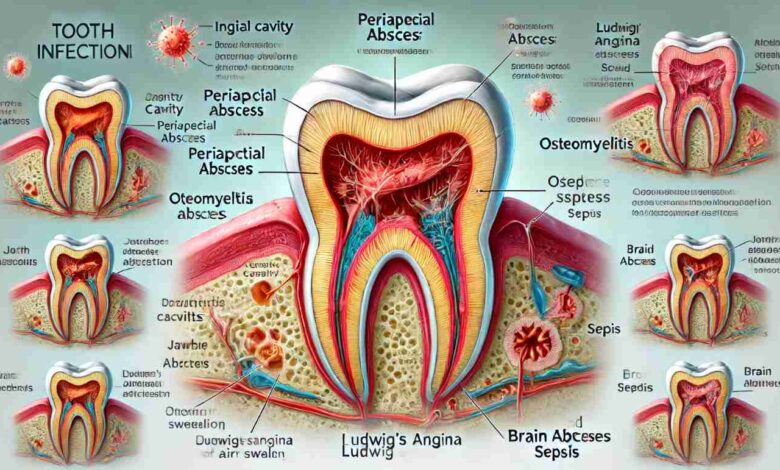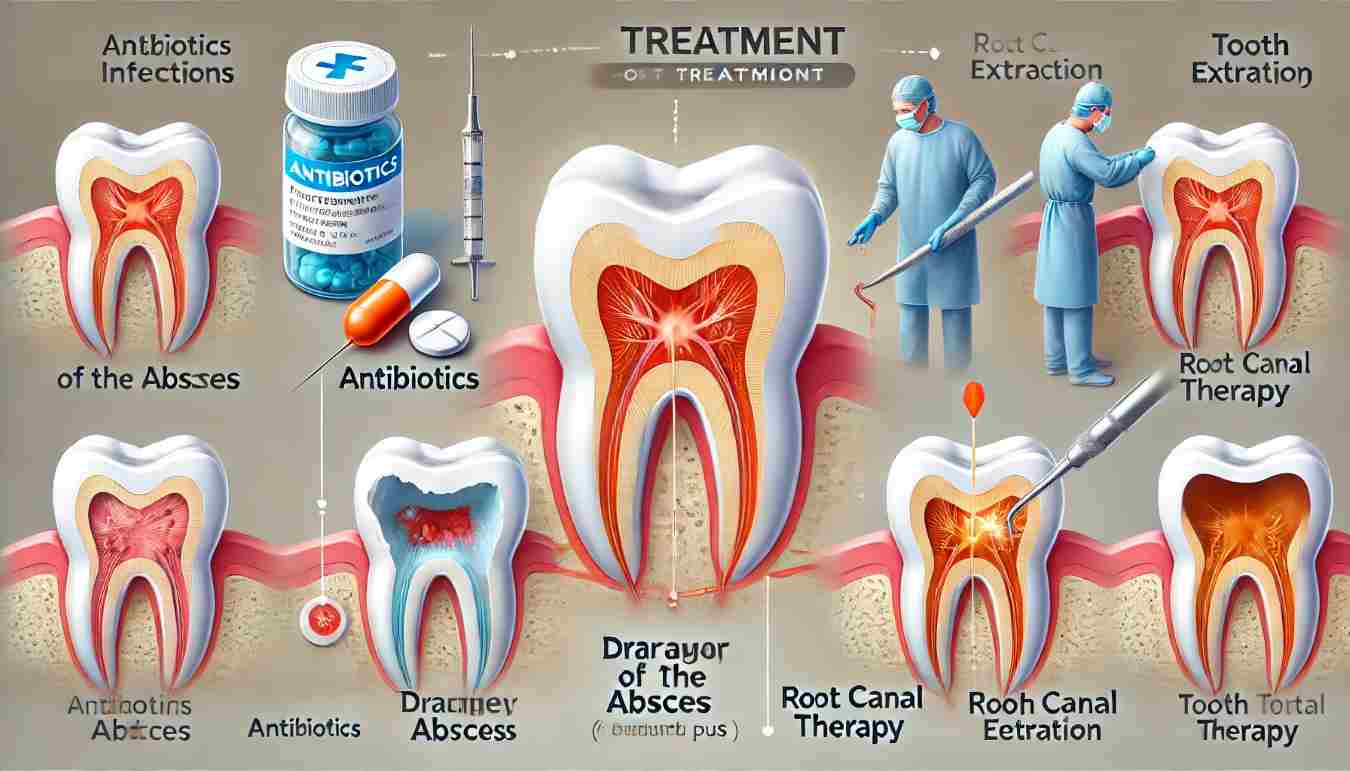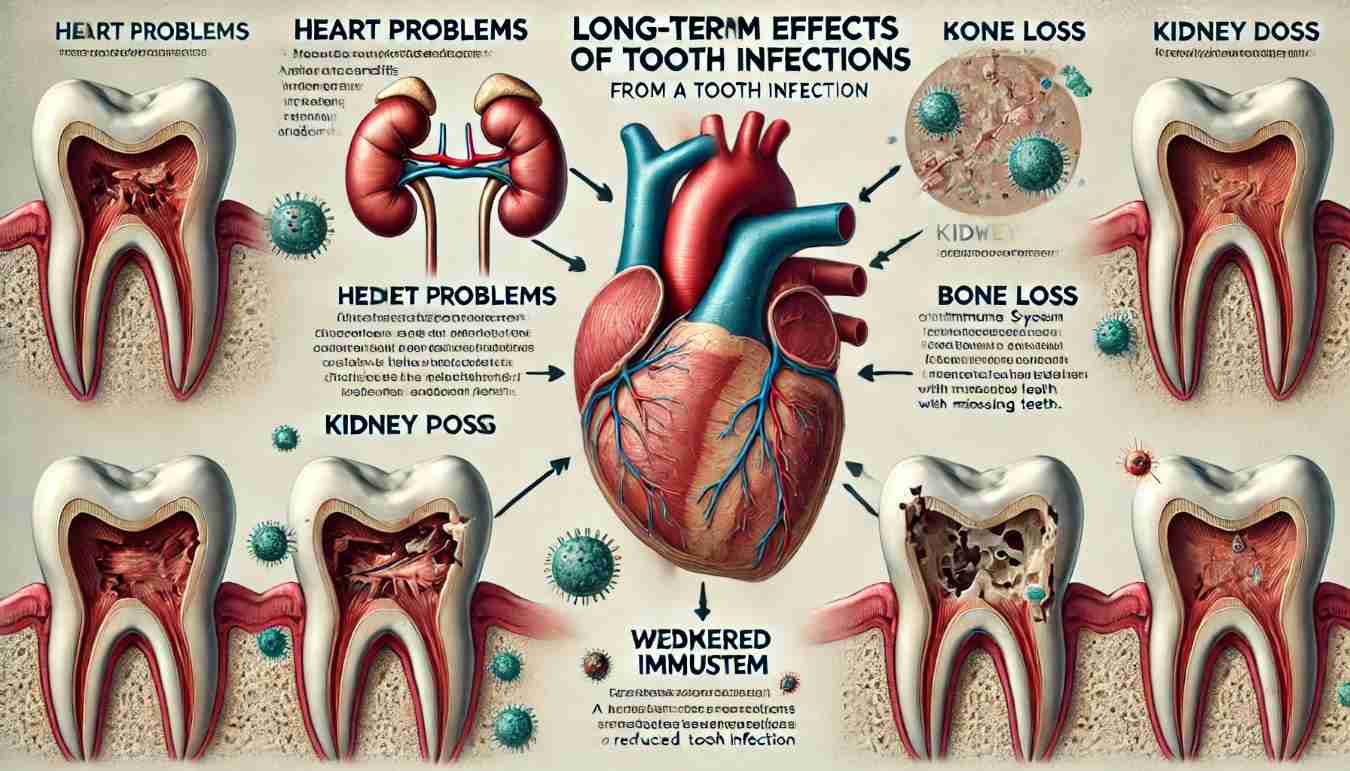How Long Until a Tooth Infection Kills You

Understanding Tooth Infections
A tooth infection also called a dental abscess happens when bacteria get into the pulp which is inside the tooth. This pulp has nerves and blood vessels that get infected when bacteria invade because of cavities or tooth injuries. Untreated infections can spread and cause big health problems and in really rare cases they might even cause death. Learning how infections happen and how to stop them is super important for keeping your teeth and body healthy.
Common Symptoms of a Tooth Infection Include:
- Severe, throbbing toothache that may radiate to the jawbone, neck, or ear.
- Sensitivity to hot and cold temperatures.
- Swelling in the face or cheek.
- Tender, swollen lymph nodes under the jaw or in the neck.
- Fever.
- Difficulty breathing or swallowing.
Recognizing these symptoms early and seeking prompt dental care can prevent the infection from spreading and causing more serious health issues.
Progression and Potential Complications of Untreated Tooth Infections
If a tooth infection is not taken care of super quick it can end up spreading from just the tooth to other parts of your body. And that can cause some really bad health problems that could even turn serious and dangerous.
So you need to know how it spreads and what could happen if you ignore it. Because first the infection will stay local. But it will start spreading to tissues close to the tooth like the jawbone which is called osteomyelitis. And even the soft squishy parts of your face and neck which is called cellulitis. But then if you still don’t fix it the bacteria can get into your bloodstream.
That’s really bad because it can cause sepsis which is like your whole body going crazy with inflammation. Even your organs can stop working. It gets worse because the infection might go to special areas of the body and cause certain conditions like Ludwigs Angina which is when the bottom of your mouth gets super swollen and you might not even be able to breathe right.
Cavernous Sinus Thrombosis which is when a blood clot forms in this big vein under your brain and that could actually kill you. The bacteria might even go all the way to your brain and cause a brain abscess which is like a bunch of pus stuck in your brain tissue. And that can mess up your brain functions and you might need surgery to fix it.
So how fast a tooth infection becomes life-threatening kinda depends on how strong your immune system is. How bad the bacteria are. Or if you have other health problems. And sometimes things can get really bad in just a few days or weeks if you don’t do anything to stop it.
Historical Perspective on Tooth Infection Fatalities
The back in the day tooth infections killed lots of people because antibiotics weren’t invented yet so they couldn’t fight bacteria properly. Even around 1908 tooth infections killed anywhere from ten percent to forty percent of people who got them which was a really high and scary number. Antibiotics came along and people started brushing and going to the dentist more those death rates went way down and not as many people died. Even though this doesn’t happen a lot now, tooth infections can still be super dangerous if you ignore them so you need to get them treated quick or it could get bad.
Modern Incidence and Risk Factors
The nowadays dying from tooth infections doesn’t happen much because dental and medical care have improved a lot over time. Certain things can still make it more likely for a tooth infection to get really bad and cause serious problems. Like people with weak immune systems from stuff like HIV diabetes or chemo are at higher risk for infections.
People who can’t go to the dentist because of no money or no nearby care are also at risk. Not brushing or taking care of your teeth can let decay and infections happen easier which makes everything worse.
If you have diseases like diabetes it takes longer to heal and it’s easier for infections to spread. Knowing about these risks and going to the dentist regularly is super important so you can prevent tooth infections before they get bad.
Preventive Measures and Early Intervention
Stopping tooth infections starts with keeping your teeth clean and seeing the dentist quickly when something feels wrong. Brush your teeth twice daily and floss every day to clean away plaque and stuck food that causes problems. Go to the dentist regularly for checkups and cleanings so they can catch issues early before they get worse.
Eat healthy and don’t eat or drink too much sugar since sugar can cause your teeth to decay faster. Never smoke or use tobacco because they make gum disease and infections happen more easily. If you notice signs of infection like pain swelling or fever get to a dentist fast before it spreads. Early treatment stops the infection and keeps it from turning into a serious problem.

Treatment Options for Tooth Infections
How bad the tooth infection is will decide what treatment the dentist will need to do to fix it. Antibiotics are given to kill the bacteria especially if the infection spread beyond just the tooth. Dentists might need to drain pus from the abscess by cutting it open to relieve pain and pressure.
If the infection is inside the tooth they might do a root canal to clean it and seal it up. If the tooth is too messed up to save they might have to pull it out to stop the infection. In cases of severe infection, doctors may recommend hospitalization for IV antibiotics or, if necessary, surgery.
The Role of Antibiotics in Managing Tooth Infections
Antibiotics help control bacteria and stop severe problems when tooth infections start to spread past the tooth. They are important for fighting bacteria in infections that are not just in one spot but are spreading. But not all infections in teeth need antibiotics because some can be treated by draining or root canals.
If the infection is spreading to other body parts or soft tissue antibiotics are really needed to help. It’s very important to take all the antibiotics the dentist gives even if you feel better early. If you stop too soon the bacteria can become stronger and harder to kill later. Antibiotics do not fix the infection by themselves because dentists still need to treat the main problem.
How Quickly Can a Tooth Infection Turn Fatal?
The time for a tooth infection to become dangerous depends on the person and the situation they are in. For some people the infection can take weeks to spread but in serious cases it can take just days. A strong immune system can slow the infection but a weak one lets it spread faster. Where the infection is located also matters because areas near the airway or brain spread more quickly.
Some bacteria are very aggressive and can cause dangerous complications in a short amount of time. Signs of a fast-spreading infection include trouble breathing swallowing or swelling in the face. Noticing these warning signs early can save a life and stop serious problems from happening.

Emergency Signs That Require Immediate Attention
Knowing when to go to the ER is super important to stop a tooth infection from turning dangerous or deadly. If your face swells up a lot it might mean cellulitis which is serious and could block breathing. Having trouble swallowing or breathing could be from Ludwig’s Angina which can be life threatening if not treated fast.
A really high fever that doesn’t go away might mean the infection spread into your bloodstream which is dangerous. Bad confusion or a serious headache could mean the infection went to your brain and caused a dangerous brain abscess.
If you get any of these symptoms go to the ER or call a doctor right away to stay safe, Waiting too long can make it way worse and even cause death if not treated quickly.
The Financial and Emotional Cost of Delayed Treatment
Delaying treatment for a tooth infection raises health risks and increases both emotional stress and financial costs for patients. Emergency dental procedures and hospital visits are much more expensive than getting regular check-ups and routine dental care. Severe infections can cause pain and stress while disrupting daily life and making work or personal activities harder.
Chronic pain, missed workdays, and anxiety about health can negatively impact both physical and mental health over time. Preventive dental care, like cleanings and check-ups, is cheaper and helps avoid the serious problems caused by tooth infections.





